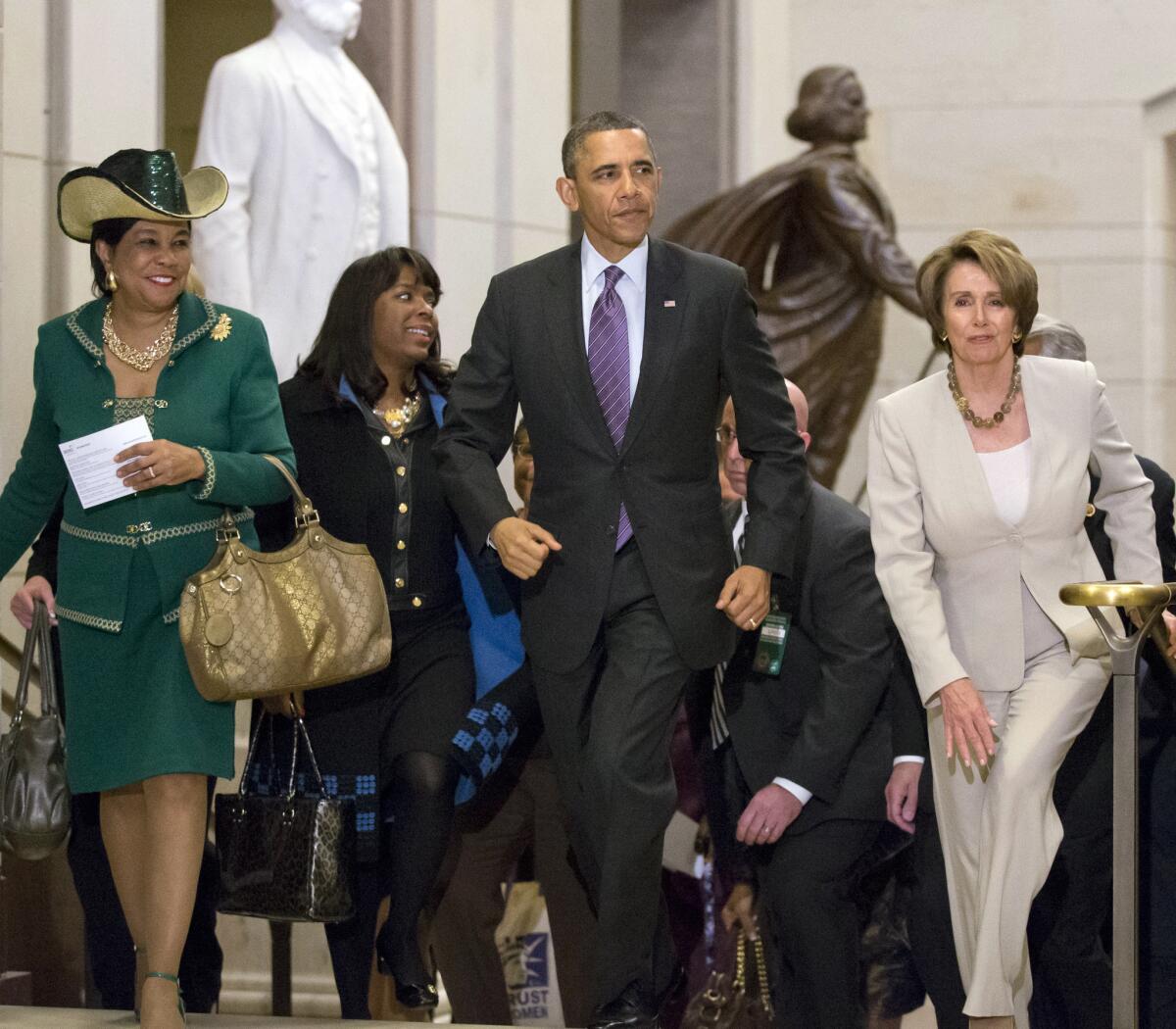Obama’s mission impossible

- Share via
Earlier this month, President Obama visited San Francisco and was joined by Democratic House Minority Leader Nancy Pelosi for a fundraising event. In the course of the evening, Obama told the donors that he expected that after the 2014 election, Pelosi would resume her place as speaker, which she relinquished after the 2010 election.
It’s easy to see why the president would want that to be so. If the Democrats were to win the 218 House seats needed for the majority and put Pelosi back in the speaker’s chair, it would allow Obama to spend his final two years in office doing more than marking time as a lame duck.
But even if Obama were to inject himself massively into the campaigns of congressional Democrats, it’s unlikely he could guarantee a Democratic victory.
A gain of congressional seats by a president’s party in his sixth year in office may not be quite as elusive as the Higgs boson or Fermat’s Last Theorem, but it’s nearly the equivalent in the political world. Only once in the last 80 years has a president’s party managed to gain seats in his second midterm election. That feat was pulled off in 1998 by Bill Clinton, when Democrats gained eight seats on the GOP. In general, however, losses by presidents in midterm elections are as predictable as anything in politics.
Consider Ronald Reagan in 1986, when he was desperate to have the GOP retain control of the Senate. Reagan saw one seat in particular as crucial to win, a seat in Nevada being vacated by his friend Sen. Paul Laxalt. Hoping to capitalize on his popularity in a state he had carried in 1984, Reagan made two early appearances in Nevada on behalf of the GOP candidate. Both of these visits produced surges for the Republican that quickly receded.
Reagan resolved to return to Las Vegas on the day before the election to plead for votes, a visit strongly opposed by his chief of staff, Donald Regan, who feared that the effort would be in a losing cause. Reagan went, reminding voters that “my name will never appear on a ballot again,” and ending his speech with a plea to “win one for the Gipper.” The next day, the Republican was defeated by a Democratic House member named Harry Reid.
So why did Obama make such a rash prediction about returning Pelosi to office in the face of this bleak historical record? The answer is simple: He had to.
Obama’s legacy-building initiatives, such as immigration reform, face a wall of Republican opposition in the House. He is also pushing for a tax increase on upper-income Americans, a cap-and-trade bill and an increase in the federal minimum wage, all of which would face even stiffer opposition than immigration reform. Should he emerge from such battles with even piecemeal success, he would still face the prospect of the remaining two years of his term barren of any accomplishment should the GOP gain strength in Congress in the 2014 election.
And the House is not his only problem. Four Democratic senators from states carried by Mitt Romney in 2012 may also be vulnerable, and the likelihood of Obama defeating all 16 House Republicans who represent districts he carried in 2012 is not strong.
The pressure is on for Obama to cement his legacy by campaigning aggressively for congressional Democrats, but it encounters a well-established phenomenon that presidents are reluctant to acknowledge: A president’s popularity simply cannot be transferred to another candidate. There are no presidential coattails in midterm congressional elections.
So what will Obama do in 2014? It seems likely that he will personally press the attack on the campaign trail, hoping that this time will be different. He has already activated Organizing for Action, the successor to his 2012 campaign organization. He will appeal to voters to add to his team, and he will roundly criticize Republicans for their opposition to his initiatives such as universal background checks on gun buyers and, no doubt, will invoke the memory of the murders in Newtown, Conn., in the hope of refreshing the minds of voters.
He will be eloquent and passionate, but the great weight of history tells us that he will not succeed.
Ross K. Baker is a professor of political science at Rutgers University and the author of the forthcoming book “Is Bipartisanship Dead?”
More to Read
A cure for the common opinion
Get thought-provoking perspectives with our weekly newsletter.
You may occasionally receive promotional content from the Los Angeles Times.






